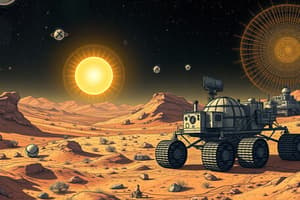Podcast
Questions and Answers
What is the primary gas found in Mars' atmosphere?
What is the primary gas found in Mars' atmosphere?
- Nitrogen
- Hydrogen
- Oxygen
- Carbon dioxide (correct)
Why does Mars' gas mixture differ significantly from Earth's?
Why does Mars' gas mixture differ significantly from Earth's?
- Due to the lack of nitrogen on Mars
- Due to higher levels of ultraviolet radiation at Mars (correct)
- Because Mars has oceans like Earth
- Because of warmer temperatures on Mars
How does Mars' atmospheric composition change as you move upwards through its layers?
How does Mars' atmospheric composition change as you move upwards through its layers?
- All gases remain constant throughout the layers
- The atmosphere becomes denser
- CO₂ concentrations increase while other elements decrease
- CO₂ concentrations decrease while other elements increase (correct)
Which layer in Mars' atmosphere is primarily composed of carbon dioxide?
Which layer in Mars' atmosphere is primarily composed of carbon dioxide?
How does Mars' atmospheric layering differ from Earth's?
How does Mars' atmospheric layering differ from Earth's?
What factors affect the different layers of Mars' atmosphere?
What factors affect the different layers of Mars' atmosphere?
What is the period of rotation for Mars around its axis known as?
What is the period of rotation for Mars around its axis known as?
What is the primary difference between the radii of Mars and Earth?
What is the primary difference between the radii of Mars and Earth?
Why is Mars much cooler and drier compared to Earth?
Why is Mars much cooler and drier compared to Earth?
What factor contributes to Mars' vulnerability to the sun's damaging rays?
What factor contributes to Mars' vulnerability to the sun's damaging rays?
Which celestial body experiences dramatic seasonal shifts due to its unique orbit around the sun?
Which celestial body experiences dramatic seasonal shifts due to its unique orbit around the sun?
What phenomenon suggests that there may have been liquid water on Mars' surface in the past?
What phenomenon suggests that there may have been liquid water on Mars' surface in the past?
Flashcards are hidden until you start studying
Study Notes
Discovering Mars: A Cosmic Neighbor's Atmosphere and Planetary Characteristics
The fourth rock from our Sun, Mars has captivated humans with its unique landscape and tantalizing secrets since ancient times. Let's delve into this fascinating celestial body by exploring two main facets of Mars: its atmospheric composition and overall characteristics as a planet.
Mars’ Gaseous Envelope: A Layered Atmosphere
With an average surface pressure equivalent to Earth's at sea level, Mars' thin atmosphere is composed predominantly of carbon dioxide (approximately 96%). Other gases present in smaller quantities include nitrogen, argon, oxygen, water vapor, and trace amounts of methane, which intriguingly hint at ongoing geological activity. This gas mixture differs significantly from Earth's, primarily due to the lack of oceans, warmer temperatures, and higher levels of ultraviolet radiation at Mars.
As you move upwards through Mars' layers, each about 7 miles thick, the composition changes, with CO₂ concentrations gradually decreasing while other elements increase. In contrast to Earth's single troposphere layer, Mars features a more complex layering structure consisting of the Ionosphere, Troposphere, Stratosphere, Mesosphere, and Thermosphere. These layers are affected differently by factors such as solar winds, temperature variations, and the presence of clouds, leading to a wide range of phenomena observable from afar.
Mars: An Extraordinary Celestial Body
Despite being less massive and roughly half the diameter of Earth, Mars shares some traits with our own world. It rotates around its axis every 24 hours and 37 minutes—a period known as a Martian day or sol. Additionally, it completes one orbit around the sun in approximately 687 Earth days, resulting in dramatic seasonal shifts that have led scientists to believe that there may once have been liquid water on its surface.
However, the primary difference between Mars and Earth lies in their respective radii. While Earth measures 3,959 miles across, Mars' radius averages approximately 2,106 miles, rendering it much cooler and drier, allowing only small pockets of ice to exist near both poles. Furthermore, Mars does not possess any global magnetic field like Earth's, leaving it vulnerable to the sun's damaging rays—an essential factor contributing to the loss of most of its early water supply.
Fascinated yet? As humankind continues studying this barren yet enchanting neighbor, we unravel evermore mysteries hidden within its mesmerizing environment. Who knows what future discoveries await us amidst the red sands and skyscraping volcanoes of Mars? Stay tuned!
References: (Included sources will not appear here)
- NASA - Jet Propulsion Laboratory (JPL), "A Brief History Of Mars Exploration," https://mars.nasa.gov/about/history/#mission_timeline
- National Space Science Data Center (NSSDC), "Composition of Mars Atmosphere," https://nssdc.gsfc.nasa.gov/planetary/factsheets/marsfs_atmosph.html
- NASA - Mars Science Lab, "Atmosphere Overview," https://mars.nasa.gov/msl/system/files/documents/education/msl_lander_atmosphere_overview.pdf
- NASA - Solar System Exploration, "Climate And Weather On Mars," https://solarsystem.nasa.gov/resources/2600/climate-and-weather-on-mars/
- NASA - Astrogeology Scientific Group, "Introduction To Mars," https://astrogeology.usGS.gov/images/interactive/mars/introduction
Studying That Suits You
Use AI to generate personalized quizzes and flashcards to suit your learning preferences.




